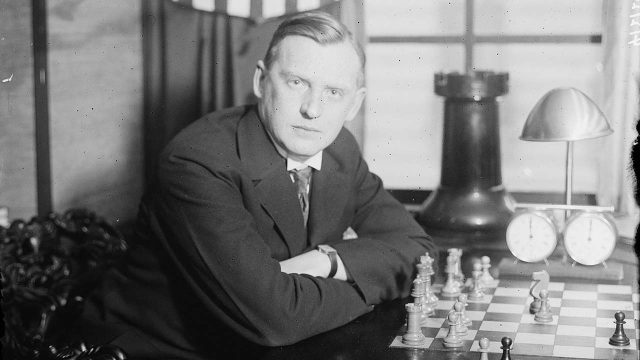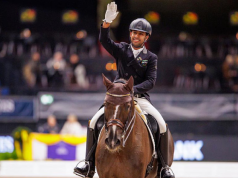In our series ‘World Champion Born On This Day’, I have the pleasure of writing a story on the ‘Genius of Chess Combinations’ – the great Alexander Alekhine.
Alexander Alekhine was a world champion who got more ‘First Brilliancy Prizes’ than any other player. He ‘terrorised’ the Chess world for almost two decades by his brilliant combinations and apt comments.
Alexander Alekhine and the Russia Factor
Alexander Alekhine was born into a wealthy Russian family in Moscow on October 31, 1892. He was introduced to Chess by his mother Anisya and his elder brother Alexei, who also played Chess.
Alekhine’s motherland Russia, has a long Chess history. The first Chess book in Russia ‘Praviladlia Shashechnoi Igry’ (Rules for the Game of Chess) can be traced back to the year 1791.
Though Russia flourished in Chess in the 19th Century, her champions Alexander Petrov and Mikhail Chigorin were unable to match their German contemporaries Adolf Anderssen and Wilhelm Steinitz. After Chigorin, it was Alekhine who became the strongest player in Russia and started making regular appearance at Chess tournaments in Europe.
In St. Petersburg International Chess tournament April-May 1914, Alekhine took third place, behind Emanuel Lasker (then World Champion) and José Raúl Capablanca (the next world champion).
Tsar Nicholas II, a great Chess lover, was so impressed by young Alekhine’s play that he chose to include Alekhine (alongwith Dr Emanuel Lasker of Germany, Jose Raul Capablanca of Cuba, Dr Sigbert Tarrasch of Germany and Frank James Marshall of USA) for a new title ‘International Chess Grandmaster’. (These five all time greats are known as ‘Five original Grandmasters’.)
The World War I and the Soviet revolution completely changed the International Chess scenario. Chess in Germany suffered a setback while things improved considerably in Soviet Union due to patronage by the Communist Party of USSR.
As per the stories narrated by Alexander Alekhine subsequently, he was jailed by the new Soviet administration for belonging to aristocracy but was soon released as they saw a ‘Potential World Chess Champion’ in him. Alekhine indeed won the World Chess Crown in 1927 and retained it till his death (1946) except a short period 1935–1937, to become the first one in the legacy of Soviet Chess World Champions.
Genius of Chess Combinations
Alekhine’s contemporary players were bewitched by his sparkling combinational ideas. It took some time for even the Chess strategists to realise that Alekhine’s combinations were always based on a very solid positional foundation. Sacrifices and sudden tactical blows made his strategical ideas far more effective, practical and powerful. Alekhine was, in fact, the founder of a universal playing style, where strategical and tactical means are fully integrated into a general long term game plan.
Alekhine was a true master of all departments of Chess. He often boasted “In order to beat Alekhine, one has to outplay him in thrice in a single game, in opening, in middlegame and in endgame”. Perhaps an exaggeration but true to a great extent. Though Alekhine’s strongest point was his middlegame, he had exceptional flair for opening phase and as well as endgame technique.
Alexander Alekhine- A multi-faceted personality
Alekhine started his association with Chess as a Chess journalist. He held a Doctorate in Law. Alekhine’s annotations were often full of sarcastic humour. In order to describe his opponent’s poor position, he once wrote “Black’s position is perfectly balanced; it is weak on the King’s side and equally so on the Queen’s!”
His brilliant combinations often demoralised his opponents who usually attributed their losses to bad health on the day. Alekhine’s famous quote ‘I am yet to beat a player who was physically fit!’ was aimed against such opponents. Here are some of his quotes which will help the reader to understand how passionate he was about Chess.
“I believe that true beauty of Chess is more than enough to satisfy all possible demands.”
“Chess first of all teaches you to be objective.”
“Chess is not only knowledge and logic.”
“A lifetime in not enough to learn everything about Chess”.
Learn from the Champion
I personally consider Alekhine to be the most intelligent person among the Chess players of all times. Probably he was not a Genius but with his IQ and logical thinking prowess, he was considered the most fearful opponent for almost three decades.
Today I have chosen a sharp tactical game by Alekhine- typical of his style of choosing the course of the game in accordance with shortcomings in the opponent’s style- played against a great Chess strategist, who did not possess equal tactical skills as Alekhine. This difference played the most important role in the course and result of the game. This is the first known game of Nimzo Indian Defence, a strategic idea that occurred to Nimzowitsch only 12 years later.
Akiba Rubinstein – Alexander Alekhine [E43]
St Petersburg International Preliminary 28.04.1914
1.d4 Nf6 2.c4 e6 3.Nc3 Bb4
Though the opening is called Nimzo Indian, it was played by Alekhine for the first time, several years before Nimzowitsch actually played it. However, he was strategically outplayed by Rubinstein and that is the reason why Alekhine never played it again despite winning the game by tactically outplaying Rubinstein.
4.e3 b6 5.Bd3 Bb7 6.f3!? 6…c5! 7.a3!
7.Nge2 is met with 7…cxd4! with equality.
7…Bxc3+! 8.bxc3 d5?!
Inconsistent with the idea of doubling the enemy pawns on ‘c3’ at cost of dark squared Bishop. 8…Nc6! was correct and in the spirit of today’s Nimzo-Indian strategy. A possible continuation is 9.Nh3 d6 10.0–0 0–0 11.Nf2 Ba6 12.Bd2 12…e5 with equality.
9.Ne2!
9.cxd5!? exd5 10.Rb1 is another way of playing the position.
9…0–0 10.0–0 Nbd7?!
10…Nc6! was better though White is better after 11.dxc5 bxc5 12.a4
11.Ng3
11.cxd5! exd5 12.Ng3 was more accurate, exploiting the ‘f5’ weakness immediately.
11…Qc7?!
11…dxc4! 12.Bxc4 Rc8! was more consistent, though White is better anyway.
12.cxd5! exd5!?
Due to specific piece configuration and position of pieces, ( Ng3 and Pawn on ‘f3’, which facilitate attack against Black’s weak king side with eventual e3–e4 and Ng3–f5), this move is a strategic error, giving a clear advantage to White. However, Black was already anticipating hasty play in centre by the adversary.
12…Nxd5 was better, though White enjoys advantage after 13.Bd2!
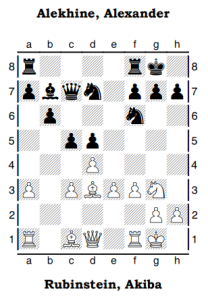
13.e4?
This allows Black a wild play. The break is premature. The preparatory 13.Ra2! Rae8 14.Re2!! would have given White a big advantage.
13…cxd4 14.cxd4 Qc3! 15.Be3 dxe4! 16.fxe4
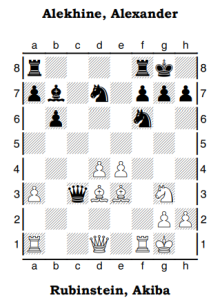
16…Ba6!!
The readers may analyse complex variations arising from 16…Bxe4! and 16…Nxe4? themselves. The text is much clearer as it doesn’t allow any attack to White. Black’s excellent tactical judgement enables him to outplay his positional opponent.
17.Bxa6 Qxe3+ 18.Kh1 Nxe4
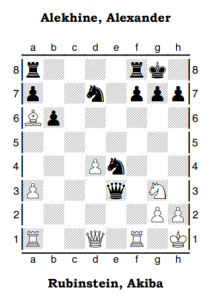
19.Nf5!
The only way to create counterplay.
19…Nf2+ 20.Rxf2 Qxf2 21.Qg4! g6 22.Rf1!
22.Ne7+?! loses to 22…Kg7 23.Qxd7?! Rad8 24.Qg4 f5!
22…Qb2!!
But not 22…Nf6? 23.Qg5 Ne4 24.Ne7+! Kh8 25.Qe5+ f6 26.Qxe4 etc. 22…Qa2!? is possible though. 23.Ne7+ Kg7 24.Qxd7 Qxa3 25.Bc8! Qd3 when Black is better. The move played, however, is the best.
23.Nh6+??
23.Ne7+! was the best chance though Black is better. The game could go 23…Kg7 24.Qxd7 Qxa3 25.Bc8 Qd3 26.Kg1 Qe3+ 27.Kh1 Qe6! with an advantage to Black. The move played loses without any counterplay.
23…Kg7 24.Nxf7!
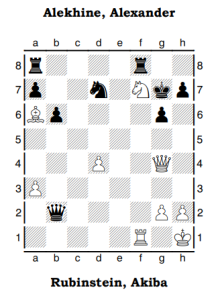
24.Qxd7? was impossible due to 24… Kxh6.
24.Nf5+ would have lost to 24… Kh8 25.Nh6 f5 etc.
24…Qb3!!
24…Nf6 25.Rxf6 Qa2!! was also possible but the text is better.
25.d5 Nf6!
25…Qxd5 26.Bc4 Qd2 was also good enough.
26.Qd4
26.Rxf6 leads to nothing. 26…Kxf6 27.Qf4+ Kg7
26…Rxf7 27.Bc4 Qa4! 28.g4
28.d6 doesn’t attack the Rook on ‘f7’, so Black simply goes 28…b5.
28…Rc8 29.Rxf6
White made this move but resigned immediately in view of 29…Rxc4 30.Rxf7+ Kxf7 31.Qf2+ Rf4 when White has no more threats or checks.
0–1

